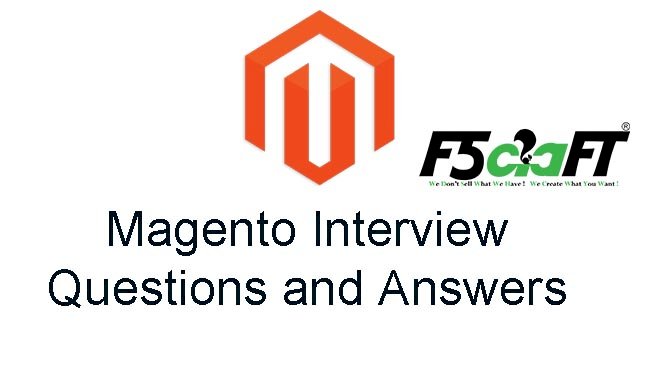Magento Interview Questions and Answers
Magento Interview, Magento Interview Answers, Magento Interview Questions

Magento is a feature-rich eCommerce platform built on open-source technology. Magento is created by Varien which is useful for online business and it has a flexible modular architecture. Designed to be completely scalable and backed by Various support network, Magento offers companies the ultimate eCommerce solution.
Question 1: What architecture is used by Magento?
Magento architecture is a typical PHP Model View Controller (MVC) application.Each system is slightly different, but all have the goal of separating data access,business logic, and user-interface code from one another.
Question 2: Why to use Magento?
These following points:
- Magento is open source E-commerce software.
- It is scalable and offers small companies to build business.
- It provides the searching and sorting of products in several ways.
- Easily integrates with many of the third-party sites which are needed to run effective E-commerce website.
- Using this, customer can order or purchase number of products.
- There are no limits on number of purchasing products.
Question 3: What are the different edition of Magento?
- Magento Community Edition
- Magento Enterprise Edition
- Magento Professional Edition
- Magento .go
Question 4: How to upgrade to the latest version using Magento Connect?
Upgrading Magento to the latest version is a fairly simple task. Copy and Paste this key Magento-core/Mage_All_Latest VIA Magento Connect where it states Paste extension key to install:. This will upgrade Magento to the newest version.
Question 5: Mention what technology does Magento use?
Magento use PHP as a web server scripting language and MySQL for database.
Question 6: What is the difference between Mage::getSingletone() andMage::getModel() in Magento?
- Mage: :getSingleton(): It always look for an existing object and if not then creates a new object
- Mage::getModel(): It always creates a new object
Question 7: Mention what are the basic features of Magento?
Basic features of Magento includes are:
- Reporting and Analytics
- Product and Catalog Browsing
- Customer Accounts
- Order Management
- Payment
- Site Management
- Shipping
- Search engine optimization
- Marketing promotions and tools
- Checkout
- International Support
Question 8: Mention what is the limitation of Magento?
- Magento is supported by PHP, comparatively to other e-commerce solutions, Magento might be slow in performance
- It becomes a complex system if it is not using object-oriented programming
- Magento requires much space and memory
Question 9: How we can enhance the Magento performance?
- Disable the Magento log
- Disable any un-used modules
- Magento Caching
- Enable Gzip compression
- Optimize your image
- Optimize your Server
- Use a Content Delivery Network (CDN)
- USE Gzip Components
- Combine external CSS/JS into one file
- Avoid CSS Expressions
- MySQL Query Caching
Question 10: What are Static Blocks?
Static block is a piece of content can be used anywhere in the pages. Magento allows creating blocks of content that can be used through the store and can be added to any page or another block.
Question 11: Why Magento use EAV database model ?
In EAV database model, data are stored in different smaller tables rather than storing in asingle table.product name is stored in catalog_product_entity_varchar tableproduct id is stored in catalog_product_entity_int tableproduct price is stored in catalog_product_entity_decimal tableMagento Use EAV database model for easy upgrade and development as this model gives more flexibility to play with data and attributes.
Question 12: Explain about the Modules of Magento?
Magento supports the installation of modules through a web-based interface accessible through the administration area of a Magento installation. Modules are hosted on the Magento eCommerce website as a PEAR server. Any community member can upload a module through the website and is made available once confirmed by a member of the Magento team. Modules are installed by entering a module key, available on the module page, into the web-based interface.
There are three categories of modules hosted on Magento Connect:
- Core Modules
- Community Modules
- Commercial Modules
Core and Community modules can be installed via the administration area. Commercial module pages provide price information and a link to an external website.
Question 13: How to Optimize the Magento Environment?
Following points describe how to optimize the Magento environment.
- It uses complex database, so that it needs to be run on dedicated servers.
- Magento application could be optimized by using cloud computing.
- Merge you JavaScript and CSS files which reduces the load time dramatically since its loading only one merged file.
- Proper MySQL configuration is one of the most important aspects in terms of performance.
- Always upgrade to the latest Magento version allows to perform better.
Question 14: Name the product types that are available in Magento?
The product types available in Magento are:
- Simple Products
- Grouped Products
- Configurable Products
- Virtual Products
- Bundled Products
- Downloadable Products
Question 15: What are disadvantages of Magento?
Following points:
- Magento uses larger disk space and memory.
- It takes much time to build the customized functionality.
- It is very slow compared to other E-commerce sites.
- It needs proper hosting environment, if the hosting environment is improper the user can face the problems.











![PHP Redirect [ Javascript Redirect ]](https://www.f5craft.in/uploads/images/image_140x98_5e80487d7d20c.jpg)













